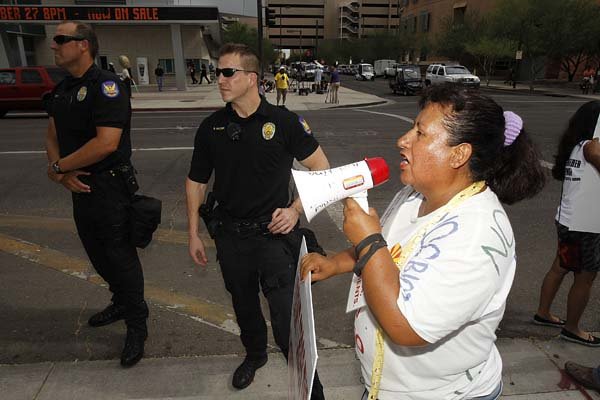LITTLE ROCK — A U.S. judge is deliberating whether to bar Arizona from enforcing a law aimed at cracking down on illegal aliens after hearing challenges from the federal government and the American Civil Liberties Union.
U.S. District Judge Susan Bolton in Phoenix heard arguments in two separate hearings Thursday where Arizona argued the challenges should be thrown out. She hasn’t said when she will rule.
The ACLU claims the measure would allow unconstitutional racial profiling by police and is seeking an order barring enforcement, while the Justice Department argued that Arizona has no right to regulate immigration under the U.S. Constitution.
Interactive
“The regulation of immigration is unquestionably, exclusively a federal power,” said Edwin Kneedler, an attorney for the Justice Department.
“What the state has done here” is “to adopt its own immigration enforcement policy.”
Arizona’s law requires that police conducting traffic stops or questioning people about possible legal violations ask them about their immigration status if there is “reasonable suspicion” that they’re in the United States illegally.
The law is a response to the federal government’s failure to help Arizona deal with an influx of illegal aliens, the state claims. Arizona’s attorneys said the state’s policies are intended to assist the U.S. in meeting its goal of curbing illegal immigration.
“You can’t catch them if you don’t know about them,” John Bouma, an attorney for the state said.
Bolton, an appointee of former President Bill Clinton, interrupted the attorneys with questions throughout the hearings, saying she wanted to be sure to deal with the specifics “provision by provision.”
“Why can’t Arizona be as inhospitable as they wish to people who have entered or remain in the United States illegally?” Bolton asked at one point.
Earlier Thursday, Bouma said the ACLU’s suit should be dismissed because the group has shown no “actual or imminent harm.” The ACLU’s “declarations are rife with conjecture and hypotheticals,” he said.
Arizona has called the law “reasonable and constitutional.” U.S. policies have left the state “under attack” from Mexican drug and alien-smuggling cartels, Republican Gov. Jan Brewer said this month. Brewer attended the hearing on the Justice Department’s claim Thursday, sitting a row behind her state’s lawyers.
Barring the state from proceeding with the law would “inflict significant and tangible, irreparable harm” to Arizona, the state wrote.
In addition, the ACLU’s lawsuit is unlikely to succeed on its merits, the state claimed.
Bouma urged the judge to ignore speculation that the law could prompt roundups of everybody in the state who looks like they might be Hispanic.
“Look around, that would be impossible,” Bouma said, looking over the crowded courtroom as other spectators watched a closed-circuit screen in an overflow room.
The bill doesn’t allow racial profiling or discrimination, Brewer said when she signed it in April.
The National Association for the Advancement of Colored People disagreed and said the statute infringes the free-speech rights of day laborers in the state.
The plaintiffs also claimed it would hinder law-enforcement efforts by making people less likely to attend community meetings or come forward to report crimes “because their appearance, limited English ability, and accents could be used by the police to question their authorization to be in the United States,” according to the complaint filed in May.
The NAACP, like the U.S., also argued that the Arizona law interferes with federal power and authority over immigration matters in violation of the U.S. Constitution.
The lawsuit seeks to represent labor, domestic-violence, day-labor, human-services and social-justice organizations in a class action. In addition, the complaint names 10 individuals who purportedly would be subject to harassment or arrest.
President Barack Obama has said overhauling immigration law is one of his highest priorities. In 2007, Congress failed in an attempt to rewrite immigration legislation for the first time in 20 years.
Obama said in April that lawmakers may lack the “appetite” to try again. Democratic leaders are focusing on measures to improve border security before addressing the 11 million illegal aliens now in the U.S.
The cases are United States of America v. State of Arizona, 2:10cv1413, and Friendly House v. Whiting, 10cv1061, U.S. District Court for Arizona (Phoenix).
Front Section, Pages 3 on 07/23/2010
